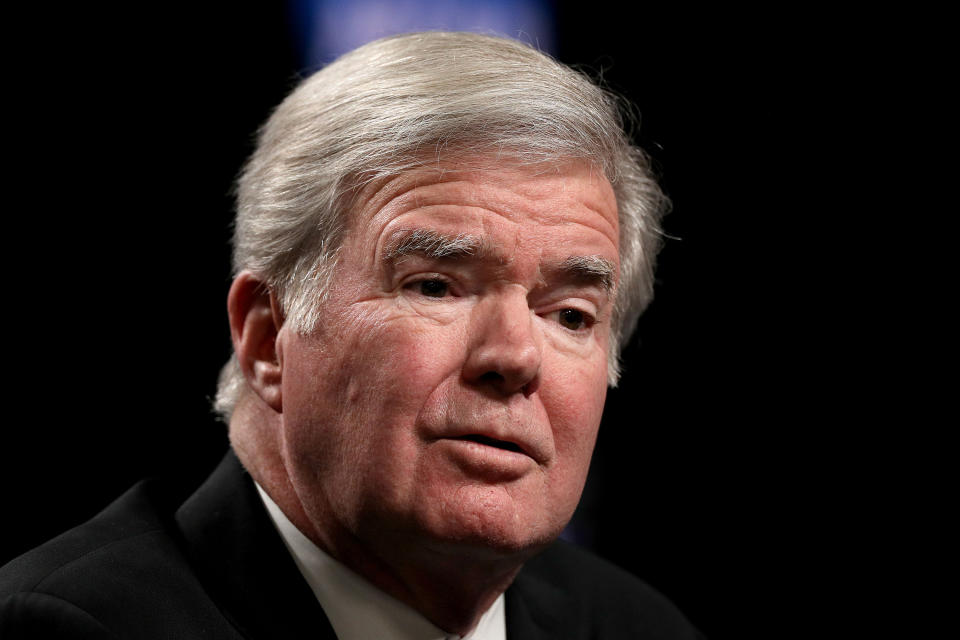NCAA's COVID-19 safety recommendations for college football include testing within 72 hours of game days — and a stern warning

As college sports tries to determine the safest way to return amid the COVID-19 pandemic, the NCAA on Thursday released a set of guidelines and a foreboding statement from the organization’s president.
Among the NCAA recommendations are testing football players within 72 hours of each game and isolating players who have prolonged contact with anyone who tests positive.
Similar measures were detailed in a draft of a document, obtained and reported by Sports Illustrated, for teams in the Power Five conferences. The protocols would be required for those teams, whereas the NCAA document listed suggested guidelines.
“This document lays out the advice of health care professionals as to how to resume college sports if we can achieve an environment where COVID-19 rates are manageable,” NCAA President Mark Emmert said in a statement. “Today, sadly, the data point in the wrong direction. If there is to be college sports in the fall, we need to get a much better handle on the pandemic.”
The NCAA recommendations would require quick turnarounds with testing, which even some professional leagues have struggled with, and that all schools have the budget and desire to follow the suggested protocols, especially when it comes to testing.
Positive tests could have major consequences on a team’s ability to field a full roster if protocols are followed. A player who tests positive must isolate for 10 days, and those in contact with an infected player must quarantine for 14 days.
The NCAA recommendations also included the following:
— Players and coaches wearing masks on the sideline.
— A team must inform its opponent if a player develops symptoms during a game and inform an opponent if a player tests positive within 48 hours after competition.
— Officials should undergo testing regularly before games.
— Workouts and practices should be outdoors and in small groups when possible.
The NCAA has received some criticism for its lack of oversight and universal mandates for colleges during the pandemic.
“The federal government has not yet published uniform federal guidance related to certain practices like diagnostic testing protocols, contact tracing and surveillance,” the NCAA release read. “But as individual states have reopened businesses and entertainment venues, the NCAA COVID-19 Advisory Panel, the AMSSM COVID-19 Working Group and the Autonomy-5 Medical Advisory Group have reviewed and evaluated those practices. Through this anecdotal evidence and related analysis and discussion, these groups have been able to identify certain practices that should be highlighted for more focused consideration by member schools.”
The release urged programs to follow local guidelines.
“This publication provides NCAA members tools to assist with their efforts to provide a healthy and safe environment for those participating in athletics,” the statement read. “While we encourage consideration of various factors and actions, we do not speak to every possible scenario, and in no event should members fall below national or public health standards set by their local communities.”
The draft of the Power Five document, dated July 8, said a positive-tested player must miss 10 days of competition and a player who has come in contact with a positive-tested person must miss 14 days. It called for weekly in-season testing, a set response for positive tests, contact-tracing plans and how to handle game cancellations, SI reported.
The Power Five document also would require testing to take place within 72 hours of a game, but it would not require sideline masks. A program would have to discontinue competition or prematurely end the season if it shows an inability to isolate “new positive cases or quarantine high-contact risk cases on campus;” if it fails to provide weekly testing; if campus or community rates become so high that local public health officials consider them unsafe; if it’s unable to perform proper contact tracing; or if public health officials find local hospitals are unable to accommodate surges in COVID-related hospitalizations.
Colleges have been grappling with the best ways to handle the upcoming football season. More than 70 colleges have reported positive coronavirus tests among athletes, and many do not publicly release numbers.
Some programs and conferences already have taken it upon themselves to ramp up safety measures. Illinois said earlier Thursday it will ban tailgating at football games and test athletes weekly.
The Big Ten and Pac-12 announced last week they will play conference-only seasons. The SEC, Big 12 and ACC are expected to announce their scheduling formats by the end of the month.
The Ivy League, Patriot League and Mid-Eastern Athletic Conference have canceled or suspended all fall sports. The Big East, which does not sanction football, eliminated all nonconference competition for the fall. The Horizon League, which also does not have football, delayed the start of its fall seasons until at least Oct. 1.
The Mid-American Conference, of which Northern Illinois is a member, announced Thursday it will delay the start of its fall sports seasons until Sept. 3 to coincide with the start of football season.
Some Power Five conference leaders have speculated whether the season will kick off, while others have pushed for a spring schedule.
Coronavirus cases are on the rise nationally with more severe outbreaks in Florida, Texas and California. More than 3.5 million Americans have tested positive, and more than 138,000 Americans have suffered COVID-19-related deaths.
———
©2020 Chicago Tribune
Visit the Chicago Tribune at www.chicagotribune.com
Distributed by Tribune Content Agency, LLC.

